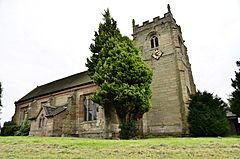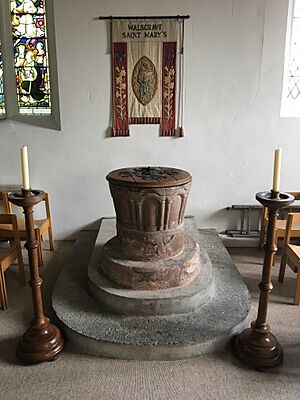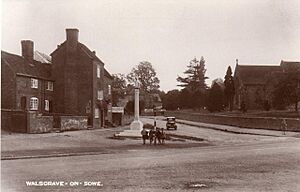St Mary's Church, Walsgrave facts for kids
Quick facts for kids Church of St Mary the Virgin |
|
|---|---|
 |
|
| General information | |
| Status | Grade II* listed |
| Town or city | Coventry |
| Country | England |
| Coordinates | 52°25′29″N 1°26′38″W / 52.4246°N 1.4440°W |
| Completed | 1300 |
The Church of St Mary the Virgin is an old and important church located in Walsgrave, a part of the city of Coventry in England. This building is considered a special historical site, known as a Grade II* listed building. This means it's protected because of its history and unique architecture.
Contents
A Look Back: The Old Norman Chapel
Long, long ago, even before the current church, a smaller chapel stood here. This was a Norman chapel, built sometime after the year 1086. The first time anyone wrote about this chapel was in 1221.
What's Left of the Old Chapel?
Today, only a few pieces from that very old Norman chapel remain. You can still see the church's font, which is a large basin used for baptisms. There's also a pillar capital, which is the decorated top part of a column. Both of these pieces are made from red sandstone.
Building the Church of St Mary
The main part of the Church of St Mary the Virgin was first built around the year 1300. Over many centuries, more parts were added. This happened during the medieval period (the Middle Ages) and also in the 1800s and 1900s.
Materials and Changes Over Time
The first church was built using local red sandstone. Later, grey sandstone was added as the church grew. The tall tower that you see today was built in the 1400s. It's interesting to know that the very first parts of the 1300 church might have been completely rebuilt later in the 1200s or 1300s. This means the church has changed a lot over time!
Special Old Features
Many parts of the church from the medieval period are very important historically. This includes the beautiful windows from the 1300s and other old decorations and fixtures inside the church.
The Churchyard's Transformation
In 1951, a big change happened to the wall around the churchyard. The wall that ran along the street was taken down. The ground inside the churchyard was also made flatter and sloped down towards the street. During this work, some old grave markers were moved. They were placed upright against the south wall of the churchyard or laid flat around the church grounds.
 | Isaac Myers |
 | D. Hamilton Jackson |
 | A. Philip Randolph |



